Insights from the UK’s Public Sector Fraud Authority secondment program
While recently in the UK, I visited Bletchley Park. This inconspicuous country estate 40 minutes north of London was home to the Government Code and Cypher School during World War II. It is now a dedicated museum and I opted for the virtual tour. With a simple set of headphones, I was taken on a journey though how operation ‘Ultra’ grew from a small team that occupied the old country house in the late 1930s to a bustling intelligence factory during war years.
During the tour, I learned that Bletchley Park became a beacon for experts in various fields, including mathematicians, historians, linguists and even chess champions, all focused on a common mission: to penetrate the secret communications of the Axis Powers, most notably the German Enigma cipher. This had a profound impact on the war and ultimately changed the course of history. According to the official historian of British Intelligence in World War II, Sir Harry Hinsley, the ‘Ultra’ intelligence produced by the dedicated codebreakers at Bletchley Park not only helped bring victory to the Allied Forces, such as supporting the D-Day invasion, it shortened the war by no less than 2 years and probably by 4 years.

Like Bletchley Park, the UK’s Public Sector Fraud Authority (PSFA) started from humble beginnings when launched in August 2022 and is growing into a significant operation. This is because transforming the way government manages fraud is no small undertaking. It requires us to further our understanding of fraud against the public sector and progress us towards a modern, more proactive response.
During a recent address at the launch of the University of Portsmouth’s Centre for Cybercrime and Economic Crime, CEO Mark Cheeseman OBE, speaking on the ambition of the PSFA said, ‘We are not here to just do a good job today; we need to build a better structure for those who come next.’ Mr Cheeseman added it was important to continue to innovate and evolve as fraud continually evolved. There was also a need to continue building deep counter-fraud capability and expertise as fraudsters were a very capable adversary. Fraud was often their profession and they were experts in examining government schemes and finding creative ways to exploit vulnerabilities for their own dishonest gain.
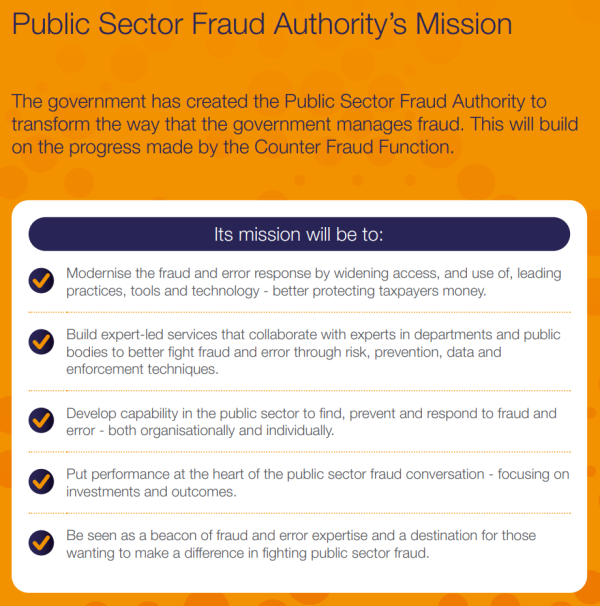
Strong international partnerships and networks are also key to addressing global challenges like fraud. The UK Government has led the way in establishing strong partnerships with counterparts across the 5-Eyes nations through the International Public Sector Fraud Forum (IPSFF). This forum has enabled member countries to leverage international experience and good practice in fraud prevention to strengthen counter fraud capability across our respective public sectors. The new IPSFF secondment program deepens this engagement and will accelerate the sharing of expertise and capability. It is fitting that the UK was the first nation to host a secondee under this program, and I had the privilege of spending 3 months working with the dedicated team at the PSFA.
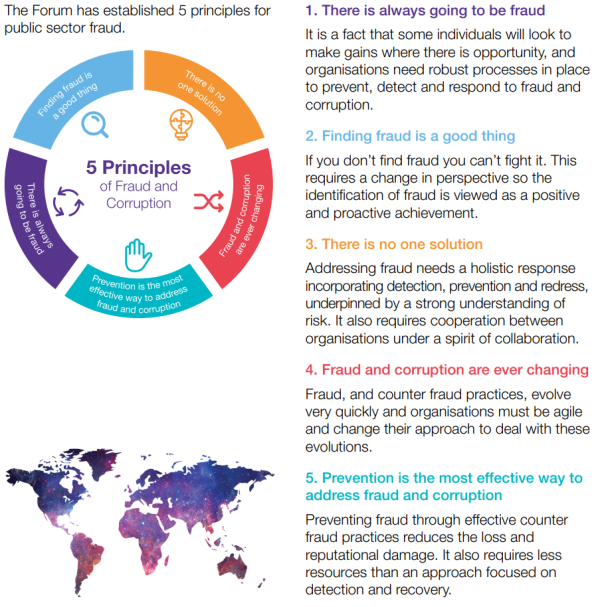
A primary aim of the IPSFF secondment program is to achieve capability uplift in IPSFF member nations by directly sharing knowledge and skills. The secondment created space for me to step away from my day-to-day work at the Commonwealth Fraud Prevention Centre and focus on delivering specific objectives and innovations to help the UK public sector more effectively prevent fraud. This primarily involved sharing knowledge, collaborating with experts across jurisdictions and developing new capability. This included sharing Australian innovations and leading practices in fraud prevention, such demonstrating how to use our Fraudster Personas in practical ways to identify fraud risks and vulnerabilities, and developing a new Fraud Control Testing Framework for the UK public sector. The reception I received from those who work in the PSFA and broader Counter Fraud Function has been inspiring – reinforcing the need and benefits of sharing knowledge and capability not only across public bodies but across countries.
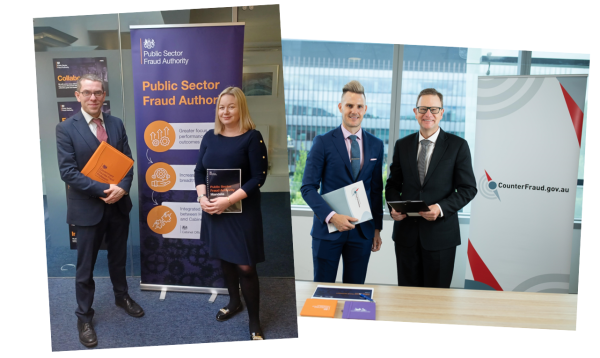
During my secondment, I also learned about different services and functions within the PSFA and the Counter Fraud Function, which I will take back to Australia to enhance our own approach to countering public sector fraud. I had the good fortune to spend time working alongside committed and capable leaders across the PSFA, giving me the chance to learn from them and also lend my support during this formative period in the PSFA’s journey. I gained a deeper understanding and appreciation of the Government Counter Fraud Profession, which is a world-leading example of bringing the counter-fraud community together under a common set of standards and develop deeper counter-fraud capability – something we need to build in Australia. I was further inspired by the PSFA’s Data and Intelligence Services, which continues to lead the world in its ability to demonstrate the power of data sharing and analytics to find and prevent fraud against the public sector. There is a real opportunity to leverage what the data and intelligence services team is creating to benefit other countries. The PSFA is also breaking new ground in the prevention of fraud with its new risk, threat and prevention service, and I was fortunate to play a role in helping this team prepare to undertake their important work in protecting critical public services and programs from fraud.
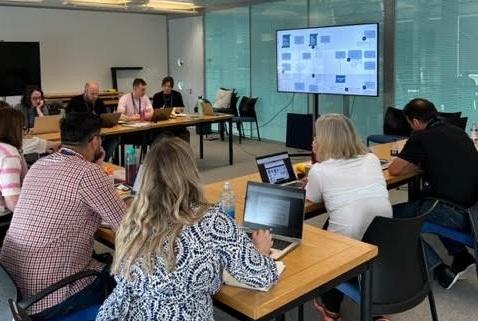
Modernising how government deals with fraud is not an easy endeavour, but it’s a noble cause. A key role of government is to use taxpayer funds for purposes that add value to society, such as building infrastructure to strengthen the economy, educating future generations, and providing quality healthcare and a strong safety net for our most vulnerable and disadvantaged citizens. Fraud against the public sector means less funds available to deliver these benefits for our society. As such, fraud is directly at odds with the role of government and robs citizens of the societal value they would hope and expect to receive from the public sector. Fraud against the public sector ultimately harms us all. Criminals who commit fraud often exploit vulnerable people, which can be traumatic, devastating and have compounding effect on victims. Fraud undermines program and policy objectives, reducing the availability and quality of essential services, and increases disadvantage and inequality in our society. Responding to fraud increases the costs involved in delivering services and running the public sector, including our law enforcement and justice system. Public sector fraud promotes negative outcomes, such as reduced trust in government and democratic processes. Crimes like identify theft are enabled by fraud and often have third-order effects such as funding further criminal activities including drug importation and terrorism.
Therefore, the mission of the PSFA and the Counter Fraud Function is one that serves the interests of the Australian public and our institutions. It’s the passionate people who work for the PSFA and the Counter Fraud Function – working through a spirit of discovery, progress and collaboration – who will achieve this mission. Like Bletchley Park, the PSFA has become a beacon of expertise and a destination for those wanting to make a difference. It was a privilege to meet and work with them across every level, function and service, and identify where we can build even closer ties across our public sectors. These connections will further enhance and sustain the knowledge sharing and collaboration between the UK and Australia, fulfilling the objectives of the IPSFF secondment program and deepening the strategic partnership between the PSFA and Commonwealth Fraud Prevention Centre.
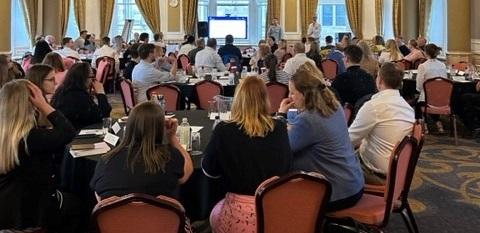
The 3-month secondment in the PSFA was immensely rewarding to me personally and will deliver lasting benefits for both countries. I’m excited to see what will be achieved by future IPSFF secondees as they set off across the world to advance our shared mission to fight public sector fraud.
Author: Chris McDermott


